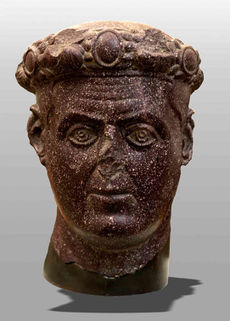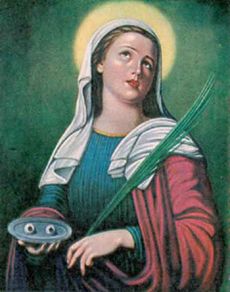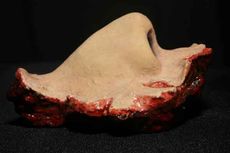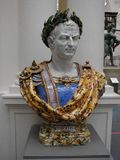Galerius
It is a scene out of a horror film. Lying and dying on a couch, Emperor Galerius (250-311) is trying to sign a document. It reads in Latin and Greek I am so sorry, really sorry. Then as the scroll is taken from him, Galerius's body explodes into a mass of worms and maggots. If he had marked the document to save his body it is too late. A bucket of entrails later, Galerius's mortal remains are collected and dumped inside a gloomy room. The last great Roman pagan is dead. God had spoken. There would be no flies on Him.
Background[edit | edit source]
Galerius is another Roman emperor from the same Illyrian stable as Diocletian, Maximian and Constantius I. Built like a thug, Galerius was illiterate and remained one all his life. His mother Romula was head screecher with a local mystery cult and claimed Hercules had caught her in the bushes and 'made' Galerius. From his mother Galerius inherited an extreme aversion of the written word would later make him deeply suspicious of any 'book fetish' cult. Within that ambit he would include Christianity, Judiasm and the relatively new Manichaen religions which were all 'wordy' mumbo-jumbo to Galerius.
The young brute appears to have joined the Roman army in his early 20s. His friends from this time would include a number of future emperors and he came under the influence of Diocletian. When in 284-285 Diocletian became undisputed heavyweight Roman emperor of the known world, Galerius shared the success of his boss. A few years later Galerius got to marry the Valeria, daughter of Diocletian and in 293 he became Caesar, Deputy Emperor of the Roman Empire in the East. This arrangement was part of Diocletian's complicated Tetrarch System of government which saw them share power with Maximian and Constantius I 'the colourless' in the western half of the empire. A settlement that saw four sets of bureaucrats shifting the blame around when things went wrong (often).
Home and Away[edit | edit source]

Galerius was allocated a palace at Sirmium, not too far up the road from where he was born. He was placed in charge of the Danube frontier and that meant dealing with the Goths and other fashion victims on the wrong side of Civilisation. Valeria had been promised luxury but Sirmium turned out to be a dump. To make her happier, Galerius named the province after his disgruntled wife but it no Rome or Alexandria.
A few years of grim married life then followed. Galerius preferred to spend time with his friends (including a louche future emperor Licinius and whores, one of whom gave him a son he named Candidianus.(Latin for 'whiter than white'). Valeria appears to have been unwilling to produce a son as ugly as his father and spent more time learning the rites and rituals of a religion called Ron-ism. However outwardly nothing changed, Galerius may have been uneducated but he wasn't stupid. Diocletian was a father-in-law you didn't want to get the wrong side of.
War[edit | edit source]
Galerius's success against the Germans led to Diocletian suggesting a 'Persian holiday' for his deputy, a reference to an ongoing border dispute with the Sassanid empire. For all Romans, the Persians were the type of enemy you really wanted to test yourself against. Galerius failed, he and his army were badly mauled by the superior Persian strikers but managed a draw by winning out the peace treaty after. The Persian Shah Narses was worried about problems in his back line and gave the Romans goody bags and promises of good behavior.
Galerius got his standard triumph and invitation to a victory banquet by Diocletian. There he met 'Colourless Junior', Constantine, the son of Galerius's colleague Caesar Constantius. Galerius offered to look after Constantine and 'encouraged' him to take part in some new military campaigns. Constantine correctly gauged that he had no option in the matter and joined Galerius's staff.
Exterminate the Jesus Cult![edit | edit source]
For the first time in years, the Roman Empire's frontiers were stable and the awkward political system known as the Dominate (we decide, you obey) was working well. But now back at home with his wife Valeria, he noticed she was wearing a cross around her neck and kept mentioning Jesus when they dined with friends. Galerius saw these 'Christians' as the enemy within the empire, the canker that had eroded the inner core of 'Roman virtues'. It was time to stamp on them and with his immediate superiors Diocletian and Maximum, he had a two sets of interested ears. Galerius believed in bold action. It was time to dismantle the Christian organisation: Destroy their buildings, burn their books and force the adherents to attend the temple and give thanks to the Divine Augusti and their Deputies.
Starting in 303, the Roman authorities were helped by a Christian community not being prepared for what Galerius had in mind. Popes, bishops, saints and others died rather than submit. One saint St.Lucy gave up her eyes - and then grew a new pair back as God was looking out for her. That is why she is also known as the Virgin of the Four Eyes.
As he watched his wife's face as all her fancy friends were killed, Galerius was for the first time happy. He was giving it to the Christians and their bloody books. It would be happy to retire doing this when Diocletian announced he himself was going to retire. Galerius would be the next Augustus in the Eastern half of the Roman empire.
Something is wriggling inside me[edit | edit source]
In 305 Galerius was now a co-ruler of the empire with the 'thin consumptive one', Emperor Constantius who had succeeded Maximian. The two men had nothing in common but Galerius still held his rival's son as 'honoured house bound' guest Constantine. If he had been wise, he would have arranged an accident for Constantine but the latter slipped away. A year later Constantius was dead in far away Britannia. The caesar in the West Severus became Galerius's new imperial colleague but he was someone who looked good on a coin but not effective elsewhere. However, Constantine also proclaimed himself emperor and he was soon joined on the podium by Maximian (retiring wasn't something he liked) and his son Maxentius.
Galerius instructed Severus to 'get a grip' but his protege was captured and murdered. Galerius then invaded Italy but his soldiers deserted. Nor were the Romans keen to see him either, the rapacious emperor had revoked their tax-free status (enjoyed since the era of Marius and Sulla and so one came out to support Galerius. He scuttled back home and took out his frustrations by throwing more martyrs to the flames.
It was about now that Galerius felt a lot of wriggling in his stomach. Doctors were brought in to examine him and those whose opinions he didn't like, Galerius had executed. Something was up. He tried to bring Diocletian out from retirement but the old boy refused. Feeling that he was losing his grip, Galerius appointed a new caesar Maximinus Daia to look after the East whilst he recovered on the couch. For the Western half of the empire, Galerius chose his old friend Licinius as his new co-ruler but no one there was frightened of him anymore so Licinius stayed put, an emperor only of his own bedroom.
By 311, Galerius was said to giving off a foul odour and that when he opened his mouth, maggots would fall out. His wife suggested that this weird bad health was because he had killed all her Christian friends. Eventually Galerius stopped his persecution but died soon after.
Constantine the Great's Joke on Galerius[edit | edit source]
Galerius had hoped to be buried in his own grand tomb in the city of Thessalonika. It had been built and was being fitted out when he died. Galerius was never buried there. Constantine the Great confiscated it a couple of years later and gave it to the Christians. The building is still there, a permanent reminder of how Galerius had failed to beat Christianity. But what was it with Christians and these gruesome physical punishments?




